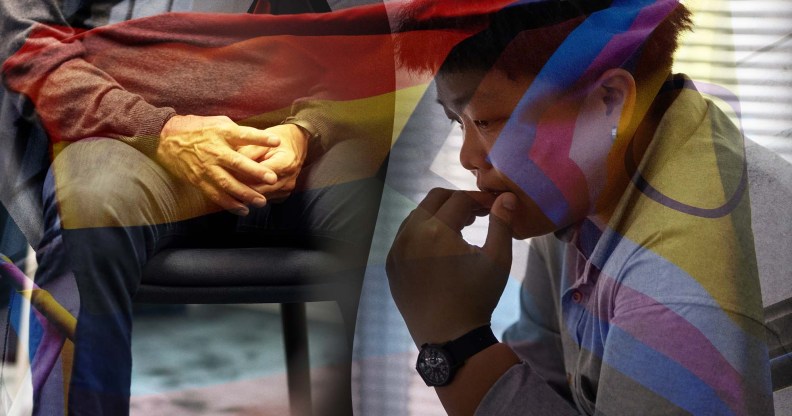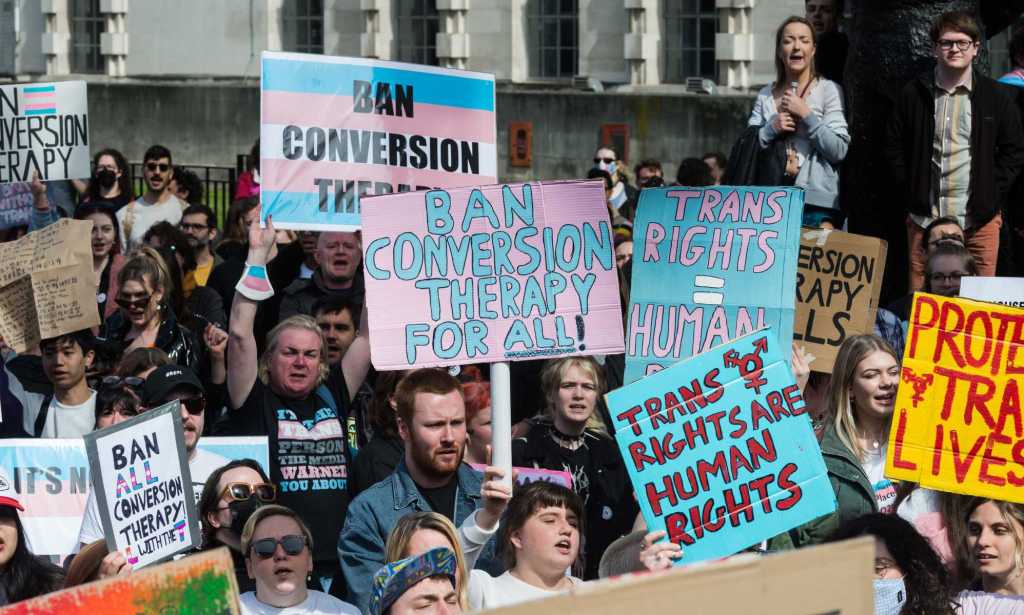Conversion therapy survivors under-25 make up one in four users of LGBTQ+ charity’s services

25 per cent of people who use Galop have suffered from horrific conversion practices (Getty Images)
A quarter of all young people who use LGBTQ+ anti-abuse charity Galop’s services have suffered some kind of so-called ‘conversion therapy’, the organisation has revealed to PinkNews.
The shocking number comes as the government is set to unveil long-promised landmark legislation which would see the practice banned.
So-called conversion therapy refers to practices which try to change or suppress someone’s orientation or gender identity. The practices can include verbal, psychological, physical and sexual abuse and violence.
Galop was selected last May to deliver a first-of-its-kind, government-funded support service for victims of conversion therapy.
A Galop spokesperson revealed that, while they cannot disclose precise numbers, a staggering 25 per cent of young people who use their services have suffered some form of conversion practice.
‘Harmful conversion practices’
The Conservatives first promised to put an end to conversion therapy in 2018 during Theresa May’s tenure as prime minister, but by 2022 her successor Boris Johnson announced plans to quietly drop the ban altogether.
Following furious public outcry, the Tories back-peddled and announced they would legislate against conversion therapy, but said it would only cover lesbian, gay and bisexual people – omitting protection for trans men and women.
Last week, in a statement to the House of Commons, the secretary of state for digital, culture, media and sport, Michelle Donelan, said that the government “recognise[s] the strength of feeling on the issue of harmful conversion practices”, and “remain[s] committed to protecting people from these practices and making sure they can live their lives free from the threat of harm or abuse”.
She added: “The bill will protect everyone, including those targeted on the basis of their sexuality or being transgender.”

The 2018 LGBT National Survey revealed that of the 108,000 people who participated, two per cent had undergone conversion or reparative therapy in an attempt to “cure” them of being LGBT, while a further five per cent had been offered it.
However, this figure could be much higher though, with the latest data from the 2021 census showing that about 1.7 million people in the UK are LGBTQ+.
Leni Morris, Galop’s chief executive, told PinkNews: “As the UK’s leading LGBT+ anti-abuse charity, [we work] directly with thousands of victims and survivors of abuse and violence every year.
“While the LGBT+ community has known for decades that there are people who use abuse and violence to try to change or suppress our identities, there is a misconception in the wider public that conversion practices are a thing of the past and that they don’t happen in the UK today.
“Galop has been working with victims of conversion practices for years – including running the National Conversion Therapy Helpline – and we not only see very clearly that this is happening now, but also that it is happening to a significant number of us. In the past year alone, 25 per cent of clients under the age of 25 have sought our help because they are currently being put through this kind of abuse.
“LGBT+ people don’t need to be changed or cured. What we need is a full ban on conversion practices under the law. The people we work with, and our whole community, deserve protection now.”
Jo’s story
Alongside the figures, Galop shared the story of Jo, who suffered conversion practices at the hands of a mental-health clinician.
Names have been changed to protect identities.
A few years ago, when Jo was a teen, they were admitted to a mental-health service for treatment.
The clinician in charge of Jo’s treatment found out they did not identify as a straight, cisgender person and began to treat this as a symptom of their diagnosed disorder.
The clinician made a correlation between Jo’s disorder and their identity, and tried to “fix’”Jo and force them to behave as a straight and cis person as part of their wider treatment. This made Jo feel ashamed and angry at themselves for being LGBT+.
Because the clinician was in control of Jo’s over-all treatment and medicine plan, Jo felt under pressure to comply.
It’s only now, after leaving the service, that Jo has been able to recognise their experience as a conversion practice which is still having an impact on them to this day.
Do you need support? You can access the National Conversion Therapy Helpline on 0800 130 3335 or by emailing [email protected]. It is open Monday to Thursday between 10am and 8.30pm, and on Fridays from 10am until 4pm.
How did this story make you feel?

